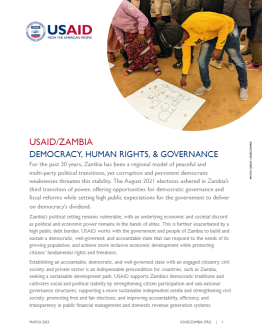For the past 30 years, Zambia has been a regional model of peaceful and multi-party political transitions, yet corruption and persistent democratic weaknesses threaten this stability. The August 2021 elections ushered in Zambia’s third transition of power, offering opportunities for democratic governance and fiscal reforms while setting high public expectations for the government to deliver on democracy’s dividend.
Zambia’s political setting remains vulnerable, with an underlying economic and societal discord as political and economic power remains in the hands of elites. This is further exacerbated by a high public debt burden. USAID works with the government and people of Zambia to build and sustain a democratic, well-governed, and accountable state that can respond to the needs of its growing population, and achieve more inclusive economic development while protecting citizens’ fundamental rights and freedoms.
Establishing an accountable, democratic, and well-governed state with an engaged citizenry, civil society, and private sector is an indispensable precondition for countries, such as Zambia, seeking a sustainable development path. USAID supports Zambia’s democratic traditions and cultivates social and political stability by strengthening citizen participation and sub-national governance structures; supporting a more sustainable independent media and strengthening civil society; promoting free and fair elections; and improving accountability, efficiency, and transparency in public financial management and domestic revenue generation systems.
STRENGTHENED CITIZEN ENGAGEMENT IN NATIONAL DEVELOPMENT CHOICES
USAID supports initiatives to increase knowledge of local government and citizens’ responsibilities and rights, driving increased citizen and private sector participation in planning, decision-making, monitoring of service delivery, and increasing citizen involvement and satisfaction with sub-national processes and services.
USAID also strengthens civil society advocacy and oversight roles through increasing the capacity of targeted civil society organizations to participate in issue-based reforms, including fiscal, political, and electoral processes. In the long term, programs in this area will contribute to generating and sustaining the political incentives of the government and the motivation of citizens and interest groups to advance meaningful reform and sustained development progress. This support raises the voices of Zambian citizens and encourages the government to be more accountable, responsive, and sustainable in the delivery of services to its citizens.
INCREASED DEMOCRATIC SPACE FOR FREE SPEECH AND ASSOCIATION
To protect freedom of expression and Zambia’s independent media, USAID increases the viability of Zambia’s independent media, access to balanced information, and helps improve content of independent media outlets, with a focus on radio broadcasting and social media. With the growth of the internet and social media users, USAID’s programs emphasize safer online civic activism and increased confidence in alternative sources of information with improved cybersafety and digital literacy.
EFFECTIVE USE OF PUBLIC RESOURCES
USAID-supported programs will improve the responsiveness and efficiency of both central ‘core of government’ ministries, such as the Ministry of Finance and National Planning, as well as local governments. They aim to enhance incremental improvements in public financial management systems at national and sub-national levels, reduce waste and leakages, and increase the availability and usability of fiscal information.
USAID initiatives bolster domestic resource mobilization, emphasizing viable actions at both national and sub-national levels to increase tax administration efficiencies, increase revenues, and reduce inequities in tax policy. USAID also develops more robust dialogue platforms for the private sector and civil society to engage with tax authorities and strengthens their capacities to advocate for their interests.
INCREASED TRANSPARENCY AND CREDIBILITY OF ELECTIONS
USAID supports local partners to reduce polarization in the civic and political landscape, advance respect for human rights, and productively channel political participation and dissent through electoral processes, which contribute to a more level playing field for elections.
To promote peace and security during the 2021 election cycle, USAID joined other donors to strengthen Zambia’s electoral institutions and key stakeholders and supported domestic civil society observation initiatives. Between election cycles, USAID invests in Zambian efforts for key electoral reforms, and greater political participation of women, youth, and persons with disabilities, in addition to protecting citizens’ right to information and civil liberties. These programs contributed to a high voter turnout in the 2021 General Election, especially among young voters, which helped assure a peaceful transition of leadership.


